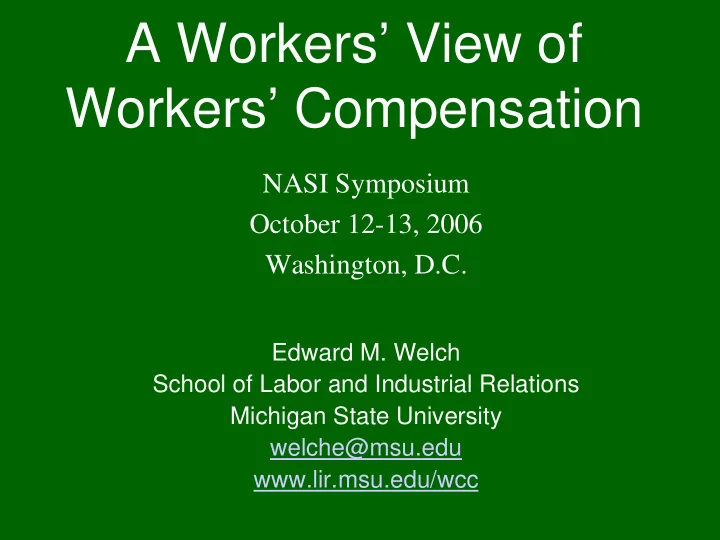

A Workers’ View of Workers’ Compensation NASI Symposium October 12-13, 2006 Washington, D.C. Edward M. Welch School of Labor and Industrial Relations Michigan State University welche@msu.edu www.lir.msu.edu/wcc
Costs Are Down Costs Per $100 of Wages 2.50 2.00 1.50 1.00 0.50 0.00 1989 1990 1991 1992 1993 1994 1995 1996 1997 1998 1999 2000 2001 2002 2003 2004 Source: National Academy of Social Insurance
Average Costs Per $100 of Wages was 19% Lower in 2004 than in 1993 2.50 2.16 2.00 1.76 1.50 1.00 0.50 0.00 1993 2004
Costs Are Down WC as Percent of Wages 3.50% 3.00% 2.50% 2.00% 1.50% 1.00% 0.50% 0.00% 1986 1987 1988 1989 1990 1991 1992 1993 1994 1995 1996 1997 1998 1999 2000 2001 2002 2003 2004 2005 2006 Source: Bureau of Labor Statistics
In 2006, WC as a Percentage of Wages was 19% Lower than it was in 1994 3.50% 3.01% 3.00% 2.50% 2.50% 2.00% 1.50% 1.00% 0.50% 0.00% 1994 2006
Benefits Are Down Benefits Per $100 of Wages 1.80 1.60 1.40 1.20 1.00 0.80 0.60 0.40 0.20 0.00 1989 1990 1991 1992 1993 1994 1995 1996 1997 1998 1999 2000 2001 2002 2003 2004 Source: National Academy of Social Insurance
Benefits Per $100 of Wages in 2004 were 33% Lower in 2004 than in 1992 1.80 1.68 1.60 1.40 1.13 1.20 1.00 0.80 0.60 0.40 0.20 0.00 1992 2004
Insurance Profits Return On Net Worth 16.0% 14.0% 12.0% 10.0% 8.0% 6.0% 4.0% 2.0% 0.0% 1985 1986 1987 1988 1989 1990 1991 1992 1993 1994 1995 1996 1997 1998 1999 2000 2001 2002 2003 2004 Source: National Association of Insurance Commissioners
Insurance Profits • 2004 was significantly lower than the highs of the mid-1990s • 2004 was dramatically up from the low of 2001 • Where are we in 2006?
“Costs are down, but they’re still too high”
Employers Can Control Their Own Workers’ Compensation Experience • Safety • Disability Management • Corporate Culture • Good Claims Management
In Workers’ Compensation in the Last 10 to 15 Years: • Employers have done very well • Workers have taken a terrible beating
An Injured Workers’ Bill of Rights
Workers Should Apply for their Rightful Benefits with Dignity • “I’m not like all of those other people.” • Injured workers have a right to their benefits
What is the Proper Value to Place on Workplace Injuries and Deaths? • For 9/11, the average death award was $2.1 million • For 9/11, the average injury claim was $384,000 • These figures are about 10 times the average award given to workers who are injured on the job
Benefit Adequacy • Most seriously injured workers suffer a large lifelong wage loss that is not replaced by workers’ compensation benefits • Workers’ compensation should replace 80% of the after-tax wage loss for work- related injuries
Defusing Myths • The widespread belief that workers live well off of workers’ compensation is not based on fact • States should conduct the research necessary to determine what happens to workers who suffer an on-the-job injury • There is a NASI commission report that discusses how to do this
Cost of Living Allowances • The purchasing power of workers’ compensation benefits erodes as time goes by • Workers’ compensation benefits should be indexed for increases in the wages
Pre-existing Conditions • The laws in many states make it harder for a worker to get benefits if he or she works in spite of the presence of some pre-existing weakness • No worker should be penalized because he or she works in spite of a pre- existing condition
Older Workers • The laws in some states make it harder for older workers to qualify for benefits and/or reduce the amount of benefits paid to older workers • Workers’ compensation laws should not discriminate against older workers
Fraud • Employer fraud adds substantially to the cost of workers’ compensation • There should be aggressive procedures for identifying and prosecuting fraud by employers, insurers, and agents. These should include civil and criminal penalties.
Starving Out Workers • Many states allow employers to withhold benefits from workers while disputes are resolved • Workers’ compensation systems should not allow employers and insurers to starve out workers while they await an adjudication of their rights
Pay What You Owe • Many states allow employers to withhold from workers benefits that are not disputed • Employers should be required to pay immediately amounts that are clearly owing
Penalty for Denying Claims • In many states, there is no incentive for employers to pay promptly, and no disincentive for employers to withhold benefits • There should be a penalty for employers who unfairly deny the payment of benefits, and/or an incentive for employers who pay promptly
Prompt Hearings • In many states, there is a long delay before hearings can be held • Within 30 days of filing a claim, there should be at least a preliminary hearing, which will determine whether benefits will be paid pending the outcome of the litigation
Attorney Fees • Most states limit the amount of money a worker can spend on his or her attorney, but put no limit on the amount an employer can spend • All parties to workers’ compensation proceedings should have the same access to effective legal representation
Withholding Healthcare • In many states, employers can withhold healthcare from workers • Employers should not be allowed to withhold needed healthcare while a workers’ compensation dispute is being litigated
It is Time to Restore Fairness to the Workers’ Compensation System
Recommend
More recommend